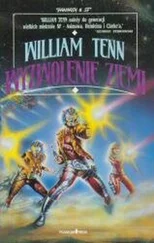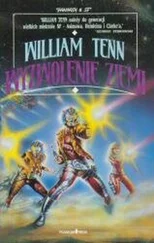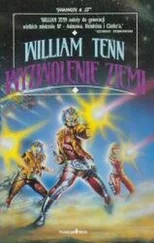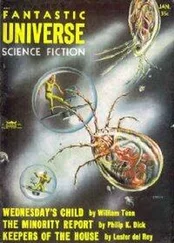William Tenn - Winthrop Was Stubborn
Здесь есть возможность читать онлайн «William Tenn - Winthrop Was Stubborn» весь текст электронной книги совершенно бесплатно (целиком полную версию без сокращений). В некоторых случаях можно слушать аудио, скачать через торрент в формате fb2 и присутствует краткое содержание. Год выпуска: 1957, Издательство: Galaxy Publishing Corporation, Жанр: Фантастика и фэнтези, на английском языке. Описание произведения, (предисловие) а так же отзывы посетителей доступны на портале библиотеки ЛибКат.
- Название:Winthrop Was Stubborn
- Автор:
- Издательство:Galaxy Publishing Corporation
- Жанр:
- Год:1957
- ISBN:нет данных
- Рейтинг книги:5 / 5. Голосов: 1
-
Избранное:Добавить в избранное
- Отзывы:
-
Ваша оценка:
- 100
- 1
- 2
- 3
- 4
- 5
Winthrop Was Stubborn: краткое содержание, описание и аннотация
Предлагаем к чтению аннотацию, описание, краткое содержание или предисловие (зависит от того, что написал сам автор книги «Winthrop Was Stubborn»). Если вы не нашли необходимую информацию о книге — напишите в комментариях, мы постараемся отыскать её.
magazine in 1957.
Winthrop Was Stubborn — читать онлайн бесплатно полную книгу (весь текст) целиком
Ниже представлен текст книги, разбитый по страницам. Система сохранения места последней прочитанной страницы, позволяет с удобством читать онлайн бесплатно книгу «Winthrop Was Stubborn», без необходимости каждый раз заново искать на чём Вы остановились. Поставьте закладку, и сможете в любой момент перейти на страницу, на которой закончили чтение.
Интервал:
Закладка:
“And I can assure you,” Mary Ann Carthington came on in swiftly, “that Gygyo Rablin is absolutely and completely the last person on Earth I would go to for a favor. It’s a personal matter, and I’d rather not discuss it now, if you don’t mind, but I would die, positively die, rather than go through that again. I did it though, because there was the teensiest chance it would help us all get home again. I don’t think we’re asking too much of you, I don’t think so one little bit.”
Mr. Mead nodded. “I agree with you, young lady. Storku is a man I haven’t seen eye to eye with since we’ve arrived, and I’ve gone out of my way to avoid him, but to have to get involved in that unholy Shriek Field madness in the bargain—” He brooded for a while over some indigestible mental fragment, then, as his cleated golf shoes began squirming lovingly, about on his feet, shook himself determinedly and went on: “It’s about time you stopped shooting off your mouth, Pollock, and got down to humdrum, specific brass tacks. Einstein’s theory of relativity isn’t going to get us back to good old 1958, and neither is your Ph.D. or M.A. or whatever. What we need now is action, action with a capi-tal A and no ifs, no ands, no buts.”
“All right, all right. I’ll do it.”
“And another thing.” Mr. Mead rolled a wicked little thought pleasurably to and fro in his mind for a moment or two before letting it out. “You take the jumper. You said yourself we don’t have the time to do any walking, and that’s doubly true right now, doubly true, when we’re right up against the dead, dead deadline. I don’t want to hear any whining and any whimpering about it making you sick. If Miss Carthington and I could take the jumper, so can you.”
In the midst of his misery, Dave Pollock rallied. “You think I won’t?” he asked scornfully. “I’ve done most of my traveling here by jumper. I’m not afraid of mechanical progress—just so long as it’s genuine progress. Of course I’ll take the jumper.”
He signaled for one with a microscopic return of his old swagger. When it appeared, he walked under it with squared shoulders. Let them all watch how a rational, scientifically-minded man goes about things, he thought. And anyway, using the jumper wasn’t nearly as upsetting to him as it seemed to be to the others. He could take jumpers in stride.
Which was infinitely more than he could say for the Oracle Machine.
For that reason, he had himself materialized outside the building which housed the machine. A bit of a walk and he might be able to get his thoughts in order.
The only trouble was, the sidewalk had other ideas. Silently, obsequiously; but nonetheless firmly, it began to move under his feet as he started walking around the squat, slightly quivering structure. It rippled him ahead at a pace somewhat faster than the one he set, changing direction as soon as he changed his.
Dave Pollock looked around at the empty streets and smiled with resignation. The sentient, eager-to-serve sidewalks didn’t bother him, either. He had expected something like that in the future, that and the enormously alert servitor houses, the clothes which changed their color and cut at the wearers’ caprice—all more or less, in one form or another, to be anticipated, by a knowledgeable man, of human progress. Even the developments in food—from the wrig-gling, telepathic, please-eat-me-and-enjoy-me stuff all the way up to the more complex culinery compositions on which an interstellarly famous chef might have worked for a year or more—was logical, if you considered how bizarre to an early American colonist, would be the fantastic, cosmopolitan variety of potables and packaged meals available in any twentieth-century supermarket.
These things, the impediments of daily life, all change and modify in time. But certain things, certain things, should not.
When the telegram had arrived in Houston, Texas, informing him that—of all the people in the United States of America—he was most similar in physical composition and characteristics to one of the prospective visitors from 2458 A.D., he had gone almost mad with joy. The celebrity he suddenly enjoyed in the faculty lunchroom was unimportant, as were the Page One stories in local newspapers under the heading: LONE STAR SON GALLOPING FUTUREWARDS.
First and foremost, it was reprieve. It was reprieve and another chance. Family responsibilities, a dying father, a sick younger sister, had prevented him from getting the advanced academic degrees necessary for a university teaching position with all of its accompanying prestige, higher income and opportunities for research. Then, when they had come to an end and he had gone hack to school, a sudden infatuation and too-hasty marriage had thrown him back onto the same treadmill. He had just begun to realize—despite the undergraduate promise he had shown and none-too-minute achievement—how thoroughly he was trapped by the pleasant residential neighborhood and cleanly modern high school between which he shuttled daily, when the telegram arrived, announcing his selection as one of the group to be sent five hundred years ahead. How it was going to help him, what, precisely, he would do with the chance, he did not know—but it had lifted him out of the ruck of anonymity; somehow, someway, it would enable him to become a striking individual at last.
Dave Pollock had not realized the extent of his good fortune until he met the other four in Washington, D. O. He had heard, of course, how the finest minds in the country had bitterly jostled and elbowed each other in a frenzied attempt to get into the group and find out what was going to develop in their speciality half a millenium hence. But not until he had talked with his prospective fellow-tourists—an itinerant worker, a Bronx housewife, a pompous mid-western business executive, a pretty but otherwise very ordinary San Francisco stenographer—did it come to him that he was the only one with any degree of scientific training.
He would be the only one capable of evaulating the amount of major technological advance! He would be the only one to correlate all the bewildering mass of minor changes into something resembling coherence! And thus, above all, he would be the only one to appreciate the essential quality of the future, the basic threads that would run through it from its underlying social fabric to its star-leaping fringes!
He, who had wanted to devote his life to knowledge-seek-ing, would exist for two weeks, unique and intellectually alone, in a five-century-long extrapolation of every laboratory and library in his age!
At first, it had been like that. Everywhere there was glory and excitement and discovery. Then, little, disagreeable things began to creep in, like the first stages of a cold. The food, the clothing, the houses—well, you either ignored it or made other arrangements. These people were extremely hospitable and quite ingenious: they didn’t at all mind providing you with more familiar meals when your intestines had revolted a couple of times. The women, with their glossy baldness and strange attitudes toward relations between the sexes —well, you had a brand-new wife at home and didn’t have to get involved with the women.
But Shriek Field, Panic Stadium, that was another matter. Dave Pollock was proud of being a thoroughly rational person. He had been proud of the future, when he first arrived, taking it almost as a personal vindication that the people in it should be so thoroughly, universally rational, too. His first acquaintance with Shriek Field had almost nauseated him. That the superb intellects he had come to know should willingly transform themselves into a frothing, hysterical pack of screaming animals, and at regular, almost medically-pre-scribed intervals… .
Читать дальшеИнтервал:
Закладка:
Похожие книги на «Winthrop Was Stubborn»
Представляем Вашему вниманию похожие книги на «Winthrop Was Stubborn» списком для выбора. Мы отобрали схожую по названию и смыслу литературу в надежде предоставить читателям больше вариантов отыскать новые, интересные, ещё непрочитанные произведения.
Обсуждение, отзывы о книге «Winthrop Was Stubborn» и просто собственные мнения читателей. Оставьте ваши комментарии, напишите, что Вы думаете о произведении, его смысле или главных героях. Укажите что конкретно понравилось, а что нет, и почему Вы так считаете.












